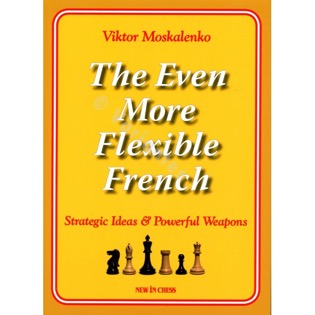Even More Flexible French, The
Viktor Moskalenko

The last decade has seen many outstanding books on the French Defense and several have been written by Ukrainian Grandmaster Viktor Moskalenko. This includes The Flexible French (2008) and The Wonderful Winawer (2010). His latest effort, The Even More Flexible French should add to his reputation.
An expanded version of his earlier work (almost 100 extra pages with earlier material updated), this book differs from other recent ones on the French. While Emanuel Bergs trilogy for Quality Chess offers a very specific and detailed repertoire, The Even More Flexible French covers much more territory in considerably fewer pages.
The plus side of this approach is that Moskalenko offers lots of choices. This includes four options against 3.Nc3 (three side lines in the Winawer and the McCutcheon) and three alternatives against the Tarrasch (3…Nf6, 3 …Be7 and 3 …c5 4.exd5 Qxd5). All of Whites other options are covered (3.e5, 2.d3, 2.Nf3 d5 3.Nc3, 2.b3 and the Exchange variation).
While The Even More Flexible French is primarily written for French players there are lines that he recommends for White. One is the variation 1.e4 e6 2.d4 d5 3.Nc3 Nf6 4.e5 Nfd7 5.Nf3 c5 6.dxc5 Nc6 7.Bf4 Bxc5 8.Bd3 f6 9.exf6 Nxf6 when instead of the older (and unpromising) 10.0-0 White has 10.Qe2!? 0-0 11.0-0-0! with sharp play. Note this is the right order to reach this position as the alternative 1.e4 e6 2.Nf3 d5 3.Nc3 (hoping for 3 …Nf6 4.e5 Nfd7 5.d4) offers Black the chance to play 3… d4 as recommended by Berg.
Players rated below 2300 will appreciate the generous offering of explanatory prose that is found throughout The Even More Flexible French. Moskalenko does an excellent job of explaining what Black is aiming for and the 103 model games this book is structured around make it more user friendly for amateur players than the traditional opening book.
The flip-side of The Even More Flexible French is that covering so much ground in one book, albeit a large one, is that the degree of detail found in Bergs trilogy is not possible. In some cases the chapters are more of an inspirational sampler (1.e4 e6 2.d4 d5 3.Nc3 Nf6 4.Bg5 Be7 5.e5 Nfd7 6.h4 0-0) than stands alone (nothing on 6.Bxe7).
Players rated below 2300 will find The Even More Flexible French an inspirational work with the caveat that they are not main line Winawer (1.e4 e6 2.d4 d5 3.Nc3 Bb4 4.e5 c5 5.a3 Bxc3+ 6.bxc3 Ne7) or Classical French (3.Nc3 Nf6 4.Bg5 Be7 or 4 …dxe4) proponents as these lines are not covered. The lucky ones that play the variations Moskalenko proposes, or who are flexible enough to take them up, will only need this volume. Higher rated players may find parts of this book useful but will generally prefer more specialized works.
